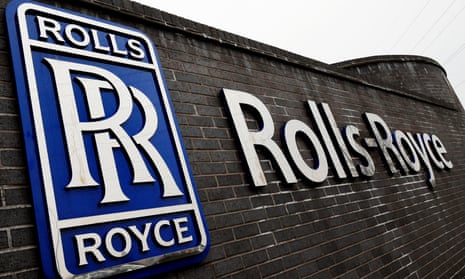Rolls-Royce’s new chief executive, Warren East, has been forced to issue a profit warning on his second day in the job at the engine maker.
The defence and aerospace company cut its guidance for annual profit by £75m to between £1.325bn and £1.475bn and said next year’s results would also be weaker than previously expected.
The surprise statement on Monday came just weeks before its half-year results on 30 July and was the fourth time the company had issued a profit warning since early last year. The group said as recently as May that it was maintaining its full-year guidance.
It scrapped a £1bn share buyback plan halfway through the programme, blaming weaker cashflow, and the company’s share price dropped 9%, later closing down 6% at 802.5p.
“This isn’t exactly how I would have chosen to spend my second day in the job,” East said. “This news is disappointing for me and for our investors and our employees.”
East said profit this year would be reduced by lower customer orders at Rolls-Royce’s marine division, which supplies the offshore oil industry. Sales have been hit by the continuing low oil price, he added.
Next year, the civil aerospace business’s profit will be reduced by £300m mainly because of lower orders and prices for its Trent 700 engines, which are being phased out. Less demand for business jet engines in emerging economies and a weaker market for maintenance of planes will also affect the division.
East took over from John Rishton, who announced his retirement in April after a gruelling few years for Rolls-Royce, traditionally seen as one of Britain’s strongest companies and manufacturers. Sales fell for the first time in a decade in 2014, with the company the subject of a Serious Fraud Office investigation into corruption allegations.
East ran ARM Holdings, the semiconductor and software design company, for 12 years until 2013. He joined Rolls-Royce as a non-executive director last year.
He said a review launched in February this year by Rolls-Royce’s new finance director, David Smith, had shown up weaknesses in how the business compiles its forecasts. As a board member, East knew there were problems and when Smith presented him with the results on Friday a board meeting was called for Sunday.
“That [review] circulated literally in the last week and over the weekend,” East said, adding that the company, which was criticised in the past for poor communication, was reporting its problems earlier and more clearly than previously.
The company has previously blamed government defence cuts, a weaker global economy and Russian sanctions, as well as low oil prices for reduced profit guidance. East and Smith said the company was now on a more sure footing.
East said it was a coincidence that the profit warning was published when the results of the Greek referendum dominated the news.
“The timing was driven by when this was solidified and, given the size of the numbers involved and the market expectations before we came out with this information, we just had to put it out to the market as soon as possible,” he said.
Rolls-Royce has announced 2,600 job cuts that will mostly affect workers at its base in Derby and in Bristol. It added to the jobs toll in May by announcing that a further 600 would go in its marine business, mostly based in Norway. The company said it was looking for further cost cuts in its marine business but East said efficiencies could be made without necessarily shedding workers.
A £200m reduction in civil aerospace profit this year will be offset by accounting benefits before the full effect of lower orders and prices for Trent 700 engines impacts on the division’s earnings next year.
East said that the company’s long-term prospects were good and that its order book was at record levels. Rolls-Royce secured its best-ever airline order in April when it agreed a £6.1bn deal to supply 200 Trent 900 engines to Emirates airline.
Sandy Morris, an analyst at stockbroker Jefferies, said despite the bad news the warning showed Smith and East were clearing up longstanding uncertainty about how Rolls-Royce reports its results.
“[The warning] generates a thumping downgrade in full-year 2016 but leaves us with profits that are less contentious and arguably higher quality in that they generate cash. In some respects, today’s update makes more sense out of things,” Morris said.

Comments (…)
Sign in or create your Guardian account to join the discussion